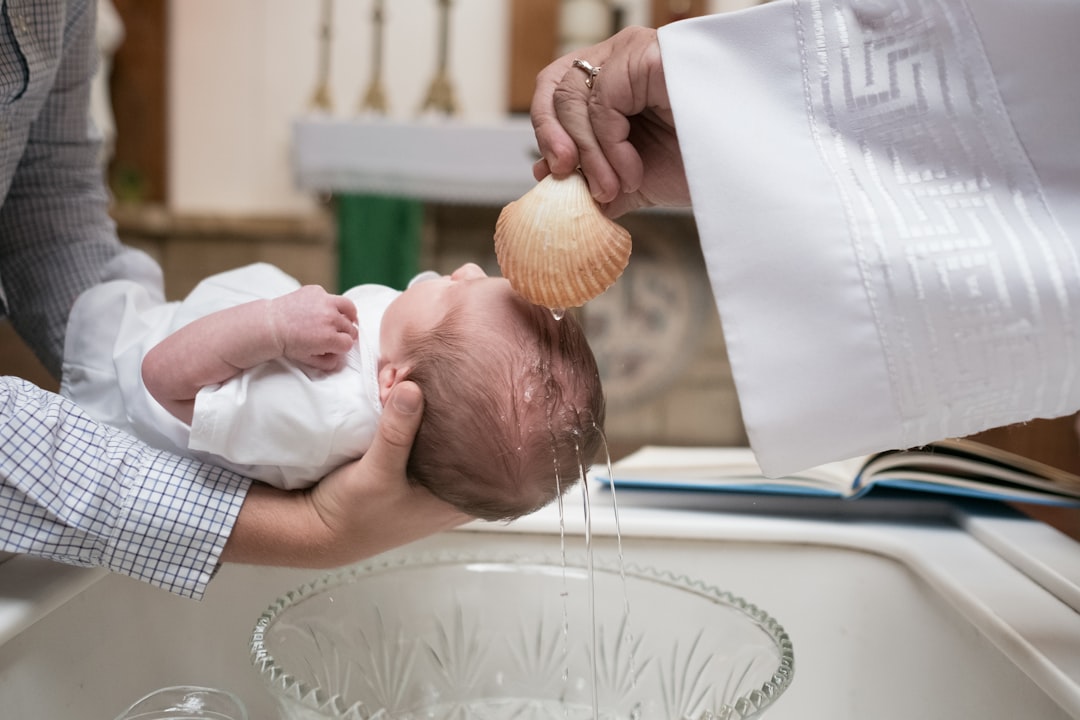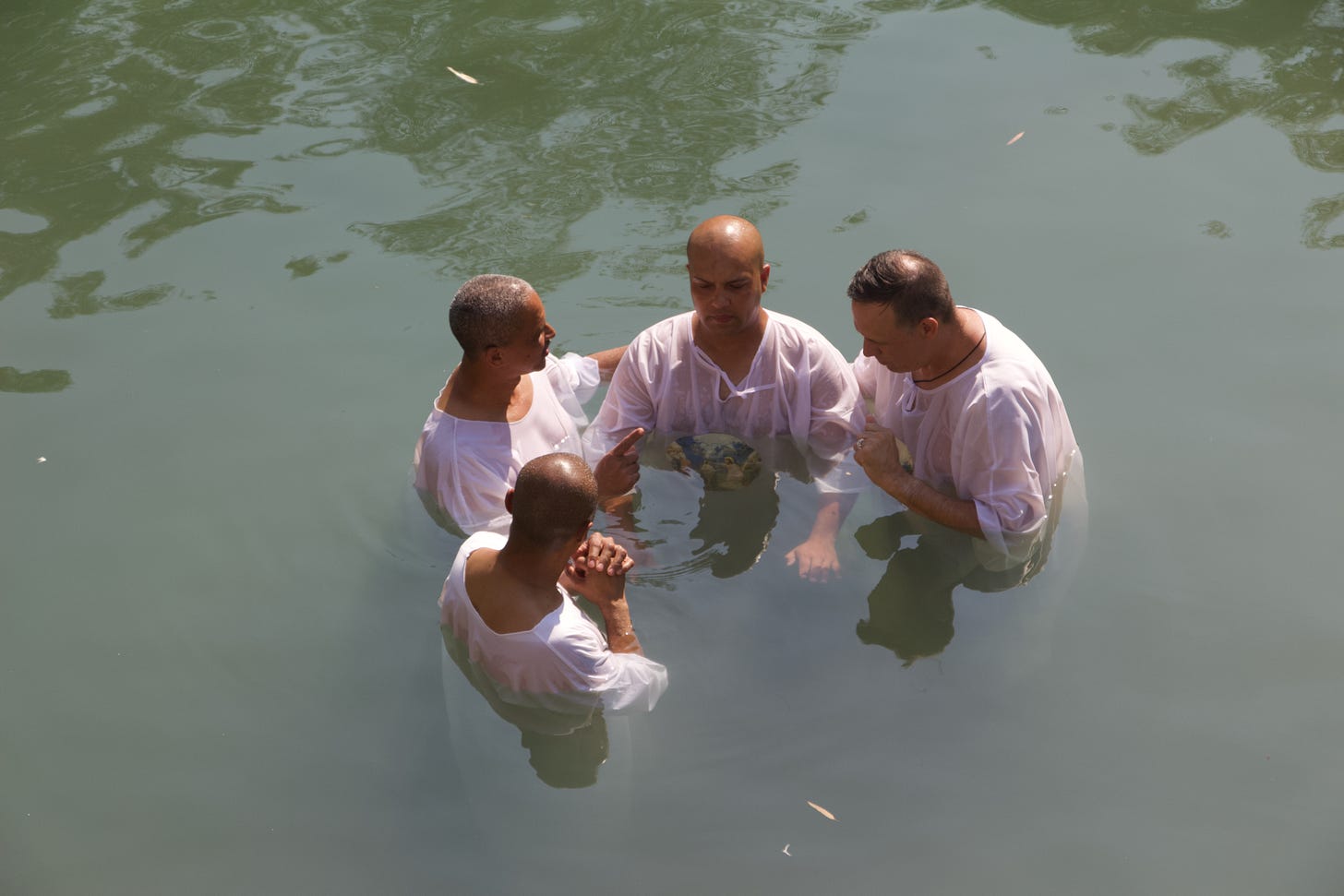1 Peter 3 Part 8: Noah and Baptism
1 Peter 3:21-22 - We are saved by faith alone through Christ. Baptism helps confirm and communicate that belief to others for those who are regenerated by the Holy Spirit.
Photo © 2018, Steven Sande. Yardenit Baptismal Center, Jordan River, Israel.
“Corresponding to that, baptism now saves you—not the removal of dirt from the flesh, but an appeal to God for a good conscience—through the resurrection of Jesus Christ, who is at the right hand of God, having gone into heaven, after angels and authorities and powers had been subjected to Him.”
1 Peter 3:21-22 NASB1995
Well, now I am attempting to wade through the last two verses of 1 Peter 3 and this is a place of controversy, as you will see. In all of my feeble attempts to explain the mysteries of the previous verses, I neglected to talk about the end of verse 20, where Peter talks about the patience of God that was kept waiting as Noah built the ark, in which a few (eight ) were brought to safety through the water. Peter is “corresponding” to that event of Noah and flood and says that baptism now saves you. Hmmm…Is this like the early church controversy that some Apostles said that believers had to be circumcised? Isn’t that works-based? Well, let’s continue the slog and get into some controversy.
First of all, Peter is NOT talking about the physical act of baptism, by immersion in water in the flesh, but in the spiritual aspect of baptism as an appeal to God for a good conscience through the resurrection of Jesus. He immediately qualifies his statement so that it cannot be misconstrued, but in spite of his efforts, unfortunately this verse becomes a proof text if you stop at the first “dash” line and don’t read things in full context. Here’s intriguing commentary on this from the author of Precept Austin on how this can lead to a very dangerous false doctrine (the links are active and go to other articles in Precept Austin or to definitions). I told you this might be controversial and I am sharing the commentary, not necessarily agreeing or disagreeing with it, but IMHO his point is a good one:
And corresponding to that baptism now saves you - STOP right there! If you do, you have just created a proof text that you can then use to justify the false doctrine that a soul absolutely must be baptized in water in order to be truly saved! Failure to read Scripture in context (and failure to adhere to the critical hermeneutical principle of Comparing Scripture with Scripture) is how one can fall into the trap of arriving at such a fatal false teaching. While ALL false teachings are detrimental to our temporal spiritual health, SOME false teachings are eternally deadly and will take a person eternally to the Lake of Fire! The teaching that water baptism saves is one of those absolutely critical false teachings. If you are wrong on this one, you will be wrong eternally (I was baptized 3 times, but only the third was genuine - see My Testimony of God's Grace)! Any group who teaches this dangerous false doctrine must be assiduously avoided like the plague lest one is infected with the virulent strain of this deadly teaching!
My mother was a Lutheran and my dad came from a family that was apathetic or even skeptical about belief when I was born. She won the battle, of course, and I was dutifully baptized as an infant. A short time later my dad was baptized as an adult into the American Lutheran church (he was also confirmed at the same time). My mother was quite fearful that you were not saved if you were not baptized (the physical ritual); she also felt that confirmation was critically important, so I went through that teenage training and ritual ceremony. Steve had a similar experience, being baptized as an infant into the Catholic Church and going through their confirmation process. These denominations practice “baptismal regeneration”, which is considered an essential element of salvation, although both Lutherans and Catholics will admit that someone can be saved without baptism (the difficult question of the thief on the cross, for example) and you can lose your salvation if you walk away from the implications of those rituals; your Baptism is still considered valid if you decide to come back. Oh, and both of those denominations do “sprinkle” baptisms, when the technique called for in the NT by John the Baptist and the early church is clearly full water immersion (Luther hated anabaptists, apparently, so he refused to call for immersion).

So, we both walked away from our childhood rituals of baptism and confirmation for quite a few years, so you can rightly ask how well did that “stick”? Well, not very well! Sadly, there are numerous organizations that are now active to help people officially renounce their infant baptisms (I’m not linking to any of those sites) because as adults, they despise Christianity or they resent having been baptized when they had no say over the matter. Fortunately for us, we came back to faith, but we now belong to a non-denominational church that considers baptism extremely important and part of the Great Commission, but limits it to children over the age of six and adults who wish to voluntary affirm or reaffirm their faith publicly (Steve did this baptism last year and found it to be a very moving experience; I am considering it although I am not sure about my physical abilities to do the process, but God would provide all I need if I ask). I like what GotQuestions.org says about this passage:
Thankfully, though, we don’t have to guess at what Peter means in this verse because he clarifies that for us with the phrase “not the removal of dirt from the flesh, but an appeal to God for a good conscience.” While Peter is connecting baptism with salvation, it is not the act of being baptized that he is referring to (not the removal of dirt from the flesh). Being immersed in water does nothing but wash away dirt. What Peter is referring to is what baptism represents, which is what saves us (an appeal to God for a good conscience through the resurrection of Jesus Christ). In other words, Peter is simply connecting baptism with belief. It is not the getting wet part that saves but the “appeal to God for a clean conscience” which is signified by baptism, that saves us. The appeal to God always comes first. First belief and repentance, then we are baptized to publicly identify ourselves with Christ.
…
Part of the confusion on this passage comes from the fact that in many ways the purpose of baptism as a public declaration of one’s faith in Christ and identification with Him has been replaced by “making a decision for Christ” or “praying a sinner’s prayer.” Baptism has been relegated to something that is done later. Yet to Peter or any of the first-century Christians, the idea that a person would confess Christ as his Savior and not be baptized as soon as possible would have been unheard of. Therefore, it is not surprising that Peter would see baptism as almost synonymous with salvation. Yet Peter makes it clear in this verse that it is not the ritual itself that saves, but the fact that we are united with Christ in His resurrection through faith, “the pledge of a good conscience toward God through the resurrection of Jesus Christ” (1 Peter 3:21).
Therefore, the baptism that Peter says saves us is the one that is preceded by faith in the propitiatory sacrifice of Christ that justifies the unrighteous sinner (Romans 3:25-26; 4:5). Baptism is the outward sign of what God has done “by the washing of regeneration and renewing by the Holy Spirit” (Titus 3:5).
The early church connected conversion to belief with baptism almost immediately afterwards so they would be surprised at how it is done in many places today. Also, all my research says that this was not done with infants in the early church. I can state with assurance that I personally disagree with infant baptism now and agree that this water ritual should be an outward symbol of what has been done “by the washing of regeneration and renewing by the Holy Spirit”; it is important to demonstrate to other believers your faith by going through baptism and UNDERSTANDING that ritual. Believing parents and godparents and a pastor may be able to understand this for an infant. However, both my dad (when he was alive) and Steve will tell you that their adult baptisms were much more meaningful than something that they can’t remember or is noted on a certificate stored somewhere in a safety deposit box or infant book. That infant baptism did nothing to keep Steve from sinning or even walking away from faith.

Oh, and Christ has ascended to heaven and is at the right hand of God and has authority over the Universe! Here’s what Enduring Word says about that wonderful knowledge:
Jesus has gone into heaven, and it is better for us that He is there. [Charles] Spurgeon related this to how the high priest, ministering for Israel on the Day of Atonement, disappeared from the people and went behind the veil. “Though he was not with them, he was with God, which was better for them. The high priest was more useful to them within the veil than outside of it; he was doing for them out of sight what he could not accomplish in their view. I delight to think that my Lord is with the Father. Sometimes I cannot get to God, my access seems blocked by my infirmity; but he is always with God to plead for me.”
Our connection with Jesus is like the little boy with his kite. His kite flew so high in the sky that he could no longer see it. Someone asked him, “How do you know it is still up there?” The boy answered, “I can feel it pull.” We can’t see Jesus enthroned in heaven, but we can certainly feel Him pull us toward Himself.
Since Jesus has gone into heaven, His Church is safe. “Let not his church tremble, let her not think of putting out the hand of unbelief to steady the ark of the Lord. The history of the church is to be the history of Christ repeated: she is to be betrayed, she is to be scourged, she is to be falsely accused and spitted on; she may have her crucifixion and her death; but she shall rise again. Her Master rose, and like him she shall rise and receive glory. You can never kill the church till you can kill Christ; and you can never defeat her till you defeat the Lord Jesus, who already wears the crown of triumph.” (Spurgeon)
Thus ends chapter 3 of 1 Peter.
My next devotional jumps into 1 Peter 4:1-2, Serving in the Last Days.
Heaven on Wheels Daily Prayer:
Dear Lord - Thank you for the regeneration and washing of this sinner through the Holy Spirit. Thank you for my parents for loving me as an infant and baptizing me; thank you for churches like ours that see baptism as a confirmation of faith for those who understand. Thank you for Jesus being at the right of the Throne of God, as He has triumphed and so will the church. Amen.
Scripture quotations taken from the (NASB®) New American Standard Bible®, Copyright © 1960, 1971, 1977, 1995 by The Lockman Foundation. Used by permission. All rights reserved. lockman.org
Commentary from Enduring Word by David Guzik is used with written permission.
Links to other commentaries are provided.



